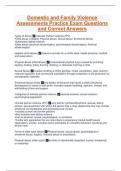Domestic and Family Violence
Assessments Practice Exam Questions
and Correct Answers
Types of Abuse ✅•Intimate Partner Violence (IPV)
•Child abuse ( Neglect, Physical abuse, Sexual abuse, Emotional abuse)
•Adolescent dating violence
•Elder abuse (physical abuse/neglect, psychological abuse/neglect, financial
abuse/neglect.
Neglect (child abuse) ✅-failure to provide for a child's basic needs (physical, medical,
and supervision)
Physical abuse (child abuse) ✅nonaccidental physical injury caused by punching,
beating, kicking, biting, burning, shaking, or otherwise harming a child
Sexual Abuse ✅includes fondling a child's genitals, incest, penetration, rape, sodomy,
indecent exposure, and commercial exploitation through prostitution or the production of
pornographic materials
Emotional abuse (child) ✅any pattern of behavior that harms a child's emotional
development or sense of self-worth; includes frequent belittling, rejection, threats, and
withholding of love and support
Categories of intimate partner violence ✅physical violence, sexual violence,
psychological aggression
intimate partner violence (IPV) ✅-any partner (girlfriend/boyfriend, spouse, dating
partner, sexual partner) with whom the person has a close relationship that may include
emotional connectedness and physical/sexual contact
-Includes current and former partners
•Also includes teen dating violence
•Can be physical, sexual, psychological, or emotional
•Youths who experience this are more likely to experience mental health issues
(depression, anxiety, suicidal) and/or participate in unhealthy behaviors (smoking and
alcohol use).
Forms of older adult abuse ✅Physical abuse, sexual abuse, psychological or
emotional abuse, neglect, financial abuse or exploitation;
Physical abuse (older adult) ✅an elder is intentionally assaulted, injured, threatened,
or restrained
, Psychological or emotional abuse (older adult) ✅includes verbal and nonverbal
behaviors intended to humiliate, isolate, or affirm control by inflicting fear and distress
Neglect (older adult) ✅failure of caregiver to meet basic older adult needs
Financial abuse or exploitation ✅unauthorized use and/or improper use of older adult's
funds/resources
Mandatory reporting ✅mandatory for older adults and other vulnerable patients
(children, mentally ill and developmentally disabled)
Health effects of violence ✅•Gender r/t gynecologic and obstetrical conditions with
impact on fetus
•Preterm, low birth weight, and perinatal death
•More likely to suffer from mental health problems
•Depression, suicide, PTTS, and substance abuse
•Children who are abused are more likely to experience ongoing poor health as they
age.
•Impact on brain development, behavioral learning delays, and higher risk for chronic
disease
Barriers to treatment of intimate partner violence ✅societal stressors, legal status, lack
of access to culturally appropriate care
Societal stressor as a barrier to treatment of IPV ✅•Poverty level leading to increased
difficulties in daily struggles and conflict in relationships
•Past experience with discrimination based on lack of understanding of cultural diversity
-Some women may feel stigmatized if they speak out
Legal status as a barrier to treatment of IPV ✅•Immigration status may prevent
individual from seeking care based on fear of deportation
Violence Against Women Act (VAWA) ✅provides legal support for IPV survivors and
includes protections for immigrant survivors .
Lack of access to culturally appropriate care as a barrier to treatment of IPV
✅•Traditional roles foster dependency. (gender roles increase IPV against women)
•Need for bilingual cultural interpreters in clinical practice settings
- Dependency of woman on their husbands forced by religious and cultural values
Recommendations for barriers to care for IPV ✅-Bicultural providers, access to
translators, education about legal rights, incorporation and acknowledgement of the
important of religion and training of religious leaders, and involvement of the family and
outreach to the community to raise awareness of the prevalence of IPV




